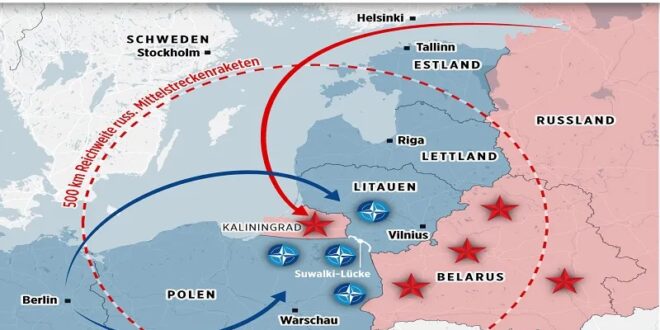While Moscow opposes the “military Schengen” due to the ease with which it’ll facilitate NATO aggression against Belarus, Kaliningrad, and/or “mainland” Russia and regards Bild’s leak as ridiculous, the Kremlin isn’t troubled by Germany reimposing its hegemony over Poland through these means.
Bild cited classified documents to report on Sunday that Germany is preparing for war with Russia per a detailed month-by-month scenario forecast produced by its Defense Ministry that begins in February 2024 and stretches into May 2025. According to them, Russia might destabilize the Baltic States and threaten the Suwalki Corridor after going on the offensive against Ukraine, thus provoking a major security crisis. Russia dismissed the document while Germany said that it’s just a training scenario.
The timing of this leak comes a little less than two months after German NATO logistics chief Lieutenant-General Alexander Sollfrank proposed the creation of a “military Schengen” for optimizing the movement of such equipment across the EU. Shortly afterwards in mid-December, Germany signed a long-awaited deal to base a tank brigade in Lithuania, which was analyzed here as being the first step towards the aforementioned plans by roping German-backed Donald Tusk’s Poland into this scheme.
“Poland Is In The Throes Of Its Worst Political Crisis Since The 1980s” as a result of his de facto liberal-globalist coup against the conservative-nationalist opposition, and “Tusk’s Appeal For Patriots To Support Ukraine Is A Distraction” from this, which also serves to advance the “military Schengen” proposal. Redirecting the public’s attention away from domestic affairs and towards that conflict in this neighboring nation importantly imbues Sollfrank’s suggestion with a heightened sense of urgency.
On the same day as Bild reported on the previously mentioned classified scenario forecast, Polish Deputy Foreign Minister Andrzej Szejn told Rzeczpospolita that “When the war is taking place beyond our eastern border, any help and cooperation from our allies is most welcome. So if the Germans want to strengthen NATO’s eastern flank in Poland as they did in Lithuania, herzlich willkommen!” RT noted that this would be the first German military deployment in Poland since the end of World War II.
The hyperlinked analyses two paragraphs above warned that the “military Schengen” could result in Tusk relying on the Germans to help purge “politically unreliable” members of the local police, intelligence community, and/or armed forces if they join the opposition’s new Solidarity movement. The pretext for requesting a German intervention could be that Russia is manipulating the Polish opposition just like it’s speculated by the German Defense Ministry that it will soon do in the Baltics per Bild’s leak.
In reality, “Tusk’s Return To Power In Poland Might Be Good News For Russia If He Does Germany’s Bidding” in the event that Berlin pulls his strings like during his first premiership to ensure Warsaw’s support for a ceasefire in Ukraine and the lifting of some anti-Russian sanctions as a reward. With German troops along the frontier with Russia upon the “military Schengen’s” implementation, Tusk could then walk back his predecessor’s military buildup plans and let those two co-manage European affairs.
That would be much better for Russia in the grand strategic sense than if the conservative-nationalist opposition returned to power and doubled down on their policy of turning Poland into a US-backed geopolitical wedge between Russia and Germany. At the same time, however, there’s also the risk that Germany’s reassertion of hegemony over Poland – accelerated as it would be by the “military Schengen” – could lead to it exploiting Poland to threaten Russia by proxy in Belarus and/or Kaliningrad.
While it remains unclear which way German-Russian relations will go, there shouldn’t be any doubt after Bild’s leak and Szejn’s announcement on the exact same day that the “military Schengen” is likely a fait accompli, but it’s Berlin’s prerogative whether to use it to exacerbate or improve ties with Russia. In any case, Russia arguably prefers a German-beholden Tusk in Poland than an American-backed conservative-nationalist since it has a much better history of working with Berlin than with Washington.
For that reason, while Moscow opposes the “military Schengen” due to the ease with which it’ll facilitate NATO aggression against Belarus, Kaliningrad, and/or “mainland” Russia and regards Bild’s leak as ridiculous, the Kremlin isn’t troubled by Germany reimposing its hegemony over Poland through these means. There’s now a chance that Germany gets Poland to support a rapprochement with Russia, which would be totally impossible if the Russophobic conservative-nationalist opposition returned to power.
 Eurasia Press & News
Eurasia Press & News




